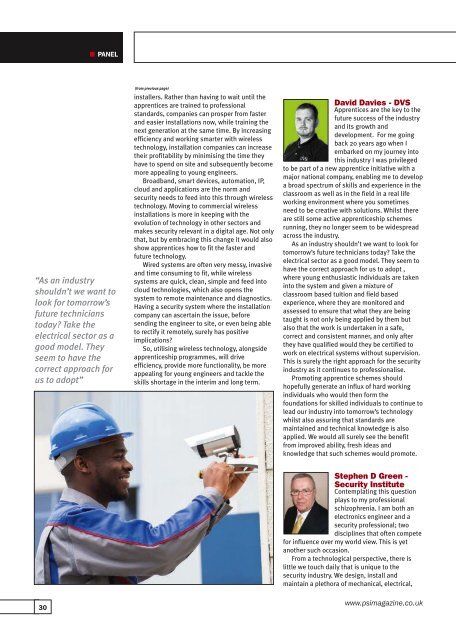PSIApril2017
You also want an ePaper? Increase the reach of your titles
YUMPU automatically turns print PDFs into web optimized ePapers that Google loves.
PANEL<br />
“As an industry<br />
shouldn’t we want to<br />
look for tomorrow’s<br />
future technicians<br />
today? Take the<br />
electrical sector as a<br />
good model. They<br />
seem to have the<br />
correct approach for<br />
us to adopt”<br />
(from previous page)<br />
installers. Rather than having to wait until the<br />
apprentices are trained to professional<br />
standards, companies can prosper from faster<br />
and easier installations now, while training the<br />
next generation at the same time. By increasing<br />
efficiency and working smarter with wireless<br />
technology, installation companies can increase<br />
their profitability by minimising the time they<br />
have to spend on site and subsequently become<br />
more appealing to young engineers.<br />
Broadband, smart devices, automation, IP,<br />
cloud and applications are the norm and<br />
security needs to feed into this through wireless<br />
technology. Moving to commercial wireless<br />
installations is more in keeping with the<br />
evolution of technology in other sectors and<br />
makes security relevant in a digital age. Not only<br />
that, but by embracing this change it would also<br />
show apprentices how to fit the faster and<br />
future technology.<br />
Wired systems are often very messy, invasive<br />
and time consuming to fit, while wireless<br />
systems are quick, clean, simple and feed into<br />
cloud technologies, which also opens the<br />
system to remote maintenance and diagnostics.<br />
Having a security system where the installation<br />
company can ascertain the issue, before<br />
sending the engineer to site, or even being able<br />
to rectify it remotely, surely has positive<br />
implications?<br />
So, utilising wireless technology, alongside<br />
apprenticeship programmes, will drive<br />
efficiency, provide more functionality, be more<br />
appealing for young engineers and tackle the<br />
skills shortage in the interim and long term.<br />
David Davies - DVS<br />
Apprentices are the key to the<br />
future success of the industry<br />
and its growth and<br />
development. For me going<br />
back 20 years ago when I<br />
embarked on my journey into<br />
this industry I was privileged<br />
to be part of a new apprentice initiative with a<br />
major national company, enabling me to develop<br />
a broad spectrum of skills and experience in the<br />
classroom as well as in the field in a real life<br />
working environment where you sometimes<br />
need to be creative with solutions. Whilst there<br />
are still some active apprenticeship schemes<br />
running, they no longer seem to be widespread<br />
across the industry.<br />
As an industry shouldn’t we want to look for<br />
tomorrow’s future technicians today? Take the<br />
electrical sector as a good model. They seem to<br />
have the correct approach for us to adopt ,<br />
where young enthusiastic individuals are taken<br />
into the system and given a mixture of<br />
classroom based tuition and field based<br />
experience, where they are monitored and<br />
assessed to ensure that what they are being<br />
taught is not only being applied by them but<br />
also that the work is undertaken in a safe,<br />
correct and consistent manner, and only after<br />
they have qualified would they be certified to<br />
work on electrical systems without supervision.<br />
This is surely the right approach for the security<br />
industry as it continues to professionalise.<br />
Promoting apprentice schemes should<br />
hopefully generate an influx of hard working<br />
individuals who would then form the<br />
foundations for skilled individuals to continue to<br />
lead our industry into tomorrow’s technology<br />
whilst also assuring that standards are<br />
maintained and technical knowledge is also<br />
applied. We would all surely see the benefit<br />
from improved ability, fresh ideas and<br />
knowledge that such schemes would promote.<br />
Stephen D Green -<br />
Security Institute<br />
Contemplating this question<br />
plays to my professional<br />
schizophrenia. I am both an<br />
electronics engineer and a<br />
security professional; two<br />
disciplines that often compete<br />
for influence over my world view. This is yet<br />
another such occasion.<br />
From a technological perspective, there is<br />
little we touch daily that is unique to the<br />
security industry. We design, install and<br />
maintain a plethora of mechanical, electrical,<br />
30<br />
www.psimagazine.co.uk

















